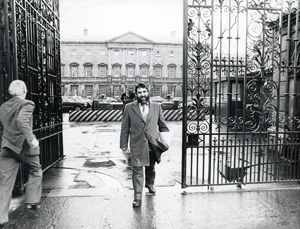18 March 2004 Edition
The best answer to McDowell and Co

After leaving the Sinn Féin Ard Chomhairle meeting last Saturday I was thinking of the renewed efforts by the Dublin 4 establishment to demonise the party. It is by no means the first time and I was reminded of photographs from the early 1980s of Sinn Féin councillors being turned away from Leinster House after Government ministers refused to meet them.
As I was passing An Phoblacht's office in Parnell Square I decided to drop in and try to find those photos in the files. And there they were - two great republicans, Councillor Eddie Fullerton of Donegal and Councillor John Joe McGirl of Leitrim walking out through the gates of Leinster House.
It was 1984. Garret Fitzgerald of Fine Gael was Taoiseach and Dick Spring of Labour was Tánaiste and they had been in office since 1982. Section 31 of the Broadcasting Act was in force and Sinn Féin was banned from tv and radio. Gerry Adams had been elected MP for West Belfast the previous summer but could not be interviewed. It was the Labour ministers who started the policy of refusing to meet Sinn Féin elected representatives.
The first test of that policy came on 1 February. Buncrana Urban Council in Donegal sent a delegation to Leinster House to meet Environment Minister Liam Kavanagh, a Labour TD for Wicklow. When Kavanagh learned that Eddie Fullerton, a Sinn Féin member of both Buncrana Urban Council and Donegal County Council, was on the delegation, he refused to meet them. Some of the cross-party delegation were prepared to abandon the meeting rather than exclude their elected colleague but Eddie Fullerton withdrew voluntarily so that the delegation could proceed and put their demands to Kavanagh. Eddie told An Phoblacht:
"I decided that if I stayed, then Kavanagh would have had his excuse to do nothing for Buncrana and rather than let him worm his way out by scoring political points, I left. If he was going to deny me the right to represent the people who vote for me, I had no intention of giving him the excuse to deny their needs."
The Coalition policy continued that spring, with Sinn Féin councillors from Galway and Longford being turned away. Then, 20 years ago, next week, on 23 March, Leitrim County Council sent a delegation which included one of its longest-serving members, Sinn Féin Councillor John Joe McGirl, a veteran republican who had been imprisoned in both the Six and 26 Counties and who had been an abstentionist TD for Sligo-Leitrim from 1957 to 1961. They were to meet Fergus O'Brien, Fine Gael junior minister at the Department of the Environment to demand more funding for the Council. Once again the minister refused to meet the delegation if the Sinn Féin councillor was included. John Joe withdrew, but some councillors protested and Independent Fianna Fáil Councillor Larry McGowan withdrew also in solidarity. "As a result of what happened today, democracy has been tarnished and undermined," said McGowan.
Both John Joe and Eddie were re-elected by the people in the local elections the following year. John Joe played a key role in ending Sinn Féin's policy of abstentionism from Leinster House in 1986. Two years later he died, after a life of unstinting service to the republican cause and to the people of County Leitrim.
Eddie's fate was to be more tragic. What should have been a long life was cut short by agents of the British government, who murdered him in his home in Buncrana in May 1991. I well recall that Eddie's posters for the local elections that year had just been printed and were stacked for collection in the hallway of An Phoblacht's office when we heard the news of his murder. Today, the campaign for truth and justice for Eddie's family continues.
Both John Joe and Eddie were first-class public representatives for their electorates and for Sinn Féin. Both represented marginalised constituencies that had suffered from decades of economic neglect, emigration and the effects of partition. Through years of hard work with their communities, they earned widespread respect, even among their political opponents at local level. Those representatives had to respect their mandate and turned out in numbers at their funerals. Their senior party colleagues skulked in silence in Dublin. The campaign of demonisation waged by successive Irish governments of all parties, along with that of the British, helped create the climate where Sinn Féin elected representatives, including Eddie Fullerton, were killed by death squads.
The best answer to McDowell and company is to emulate John Joe and Eddie in working for our communities and building Sinn Féin as a party of the people, which no amount of attempted demonisation or exclusion can deter. In 2002, Dick Spring, one of the originators of the 1984 ostracisation of Sinn Féin, lost his Dáil seat to Martin Ferris. Eddie Fullerton's fellow Sinn Féin candidate in the 1984 Euro election for Connacht-Ulster, Caoimhghín Ó Caoláin, now leads our team of five TDs. And we are only starting.
From this week, copies of these photographs will hang on the walls of our Sinn Féin office in Leinster House as a reminder of where we have come from and where we are going.


